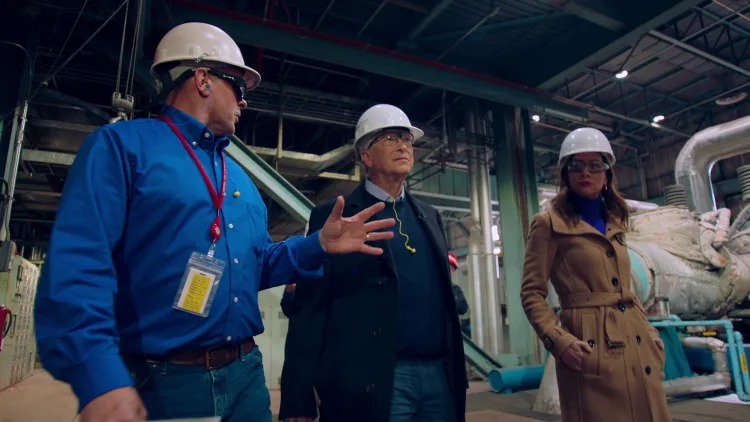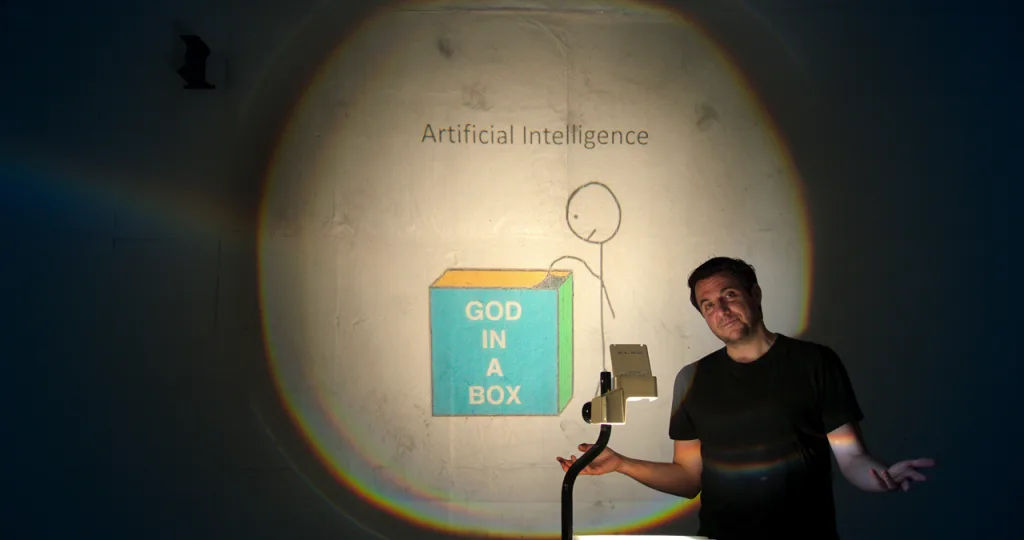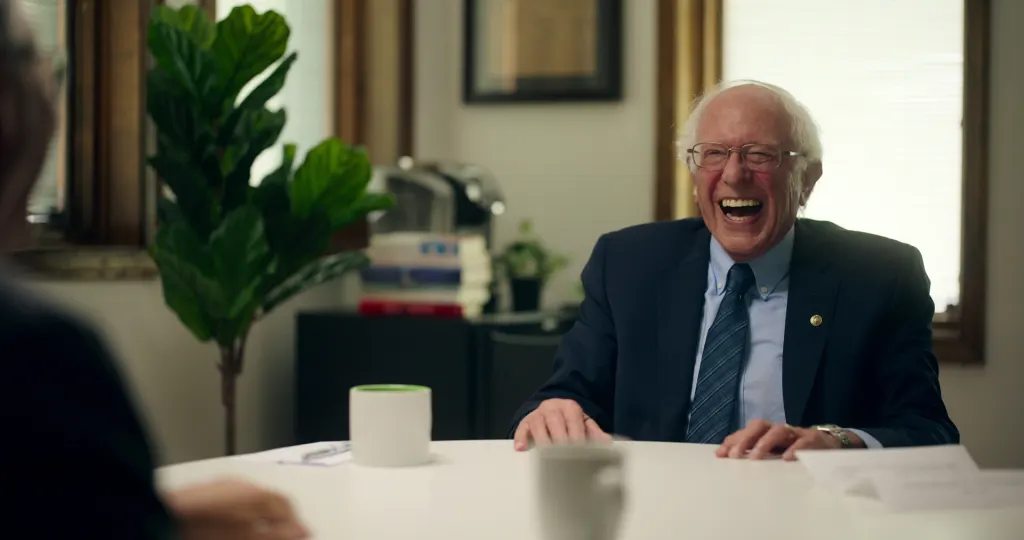- | 8:00 am
Bill Gates talks climate change, AI—and whether billionaires should exist
We talked to Bill Gates about his new five-episode Netflix series, which launches on September 18.

In a new Netflix series, What’s Next? The Future With Bill Gates, the Microsoft cofounder and philanthropist digs into a few of his biggest obsessions: the potential (and risk) of artificial intelligence, how to tackle climate change and malaria, and how to deal with misinformation and income inequality. We talked to him about some of the solutions—and about an episode in which Bernie Sanders told him that billionaires shouldn’t exist.
In the episode about climate change, when you talked to young climate activists, you were surprised by how bleak their worldview is. Did talking to them shift your own perspective in some way?
Absolutely. Their vehemence about the urgency and how they viewed it was central, and even their despair motivated me to push forward more aggressively. [But I wanted] to make sure that they get to see where their making this issue a top priority really has made a difference. I mean, they should not give up. We need them in their creative way to keep this on the agenda.
It’s very tricky for [my] generation to help the next generation by doing it right. Seeing through the eyes of the young some of their sense of how bad things were, I was able to make them feel better. But that was highly motivating to hear that energy.
You shared some examples of climate tech that could help tackle the problem, but one of the big challenges is how to scale it up. For example, Brimstone, which your company Breakthrough Energy Ventures has backed, has designed zero-emissions cement that’s as cheap or cheaper than conventional cement, right?
That’s right.
Even in that case, it’s still an enormous challenge to replace the standard process in thousands of cement plants around the world. What do you think it will take to do that? How could we actually do that as quickly as it needs to happen?
Well, getting that so-called green premium down to zero is super important when you go to places like India, where they may have, I don’t know, 5,000 cement plants alone, and of course, the demand for cement there is going up.
And so, all these Breakthrough companies, not only are we trying to have them be good investments but [we’re also] saying to them, “Okay, go to India, go around the world, license your technology. Figure out how to get [the adoption] not just in the U.S. but everywhere.” That’s why we have offices around the world, because we’re not just economically driven. We’re very purpose driven, and these companies scaling up is how we measure ourselves. How much carbon did we avoid? Cement’s a great one where people are surprised that there’s a different way of doing it that doesn’t cost more money.
It seems like in some ways, tackling climate change keeps getting harder. For example, now there’s a big jump in energy demand that’s predicted because of AI. Obviously, there are two sides to it. AI can also help with climate change, but if you look at just the energy demand, how do you think we can address that problem?
To step back, do you believe that there are some more frivolous uses of AI that shouldn’t be happening because of the consequences for energy, or do you believe we’ll be able to solve that challenge?
Well, the net additional electricity demand from AI [isn’t projected to be] greater than 10%. It’s meaningful, but driving cars takes energy. Heating buildings takes energy. Making materials takes energy. And so you have to keep it in perspective.
The AI companies are going around the country and finding spare electricity and trying to sign up for that, because as we electrify for climate, for the first time in over 30 years, even a rich country like the U.S. is going to have to increase generation. And yet we’ve added this constraint that it’s not just building a new coal plant or a natural gas plant, which is 24 hours a day, not weather dependent and very near to wherever the electricity is going to end up getting used.
The need to invest now for the increased demand is so complicated. And getting government policy right, getting the investment right—the permitting and the grid are a huge barrier to that. I’m very hopeful over time because I do think, along with continued progress with wind and solar, and even some geothermal, either nuclear fission or fusion are going to come in and play a very substantial role. And that’s why I have pretty gigantic investments to help some of those companies succeed.

How far in the future might these new nuclear technologies be available?
The best case for nuclear fission is when the TerraPower plant [a new nuclear power plant under construction in Wyoming] is running in 2030, then people will say, “Okay, let’s build 50 or 100 of those.” On fusion, the leading company, Commonwealth Fusion System, wants to be up and running by more like 2035. Fusion still is not as far along, but there are a lot of companies. I’m invested in over 5 and I think there are about 15 in total. In the long run, they may be the winners in terms of how cheap they can make electricity. And again, it’s green and not weather dependent.
It seems like you have a unique perspective because you’re deeply immersed in so many different areas—health in the developing world, agriculture, education, climate change, AI. Often people in each of these fields are focused only on that single area. How has this bigger systems perspective impacted how you think either about the problems or the solutions? Is there anything that comes to mind where you think maybe you’re making connections differently than others might be?
Well, I have a few advantages. When I was young, I was one of those hands-on people writing code, thinking through software. And I didn’t even let myself be as broad, so I could just move as fast as possible.
Now through that success, I not only got the resources but now I can take a view that’s not driven by what makes money. [For example], malaria doesn’t have some business need associated with it. But because 500,000 kids die [of malaria] each year, I can say, let’s spotlight that. And I can find the people who were like I was in my early career, who are focused in on, say, how do you kill mosquitoes? How do you make a malaria vaccine? And I can connect them with other people, help them build teams, help them get resources.
It’s a very different role than when I was young, but as you get older, even if your raw intelligence might not be at its peak, you get wisdom about how to put teams together and encourage teams. Particularly for things that take a long time that are beyond what a politician would get behind, because if it takes 10 years, they’re not going to get the rewards for it. And things like malaria eradication or using AI to make great personal tutors for the inner city, those are things that it’s going to take time to get right.
I get to find people who, in their own way, are like I was in my early career, and particularly for the things that there’s not a profit opportunity, make sure they get to do their incredible work, which is a very lucky thing. It’s why I enjoy working, even though I don’t have to.
I’m curious how much crossover you’re seeing between these spaces. Because you’re thinking about malaria, about climate change, AI, and looking at all of these separate efforts that are going on, are you finding connections or seeing anything differently because you have this zoomed-out view of the bigger picture?
Absolutely. [For example], we’re using AI to model malaria eradication. We’re using AI to say, okay, where’s polio going to break out? How do we get to zero? We’re using AI to take a pregnant mother and give her advice over her cellphone in her local African dialect.
The work I get to do—helping at Microsoft a bit, working with OpenAI, many of the foundation programs, whether it’s drug discovery or delivery—AI is in a central role there. Certainly, our education work, that’s our primary investment now. Then over in Breakthrough for climate, AI is helping us with discovering new materials, looking at new batteries, how do you run the grid? The fact that I can take that horizontal technology and then say, okay, how are we at the cutting edge on that? It all fits together.

In the episode on inequality, you talked to Bernie Sanders about his argument that billionaires shouldn’t exist. I’m guessing he probably didn’t change your mind on that. But how much do you believe that the richest Americans should be taxed?
Well, in that episode I wanted to remind people that the reason we have wealth is because we have an incentive system. And however you tune it, there are countries who, nominally, through some communist principle of equalization, have destroyed wealth creation. And therefore it’s not just a, “Hey, how do we spread it around?” It’s also, how do we make sure we continue to grow the economy?
I thought it worked out well to have Mitt Romney, Tom Friedman, and Mark Cuban [in the episode]. Bernie made good points, but when Vermont priced out giving free medical care to everybody in [the state], they said, okay, we’re not rich enough yet. If we can continue to innovate, particularly with things like AI, we will get to the point, I believe, that some of his dreams of everybody having shelter and healthcare are achievable.
I’m clear that I think we could tax rich people a lot more. But when you get to the point where you make it illegal or you have 100% taxation, I do think that’s a mistake. And somebody can say I’m biased about that, but I can see how to be a lot more progressive without outlawing billionaires.







































